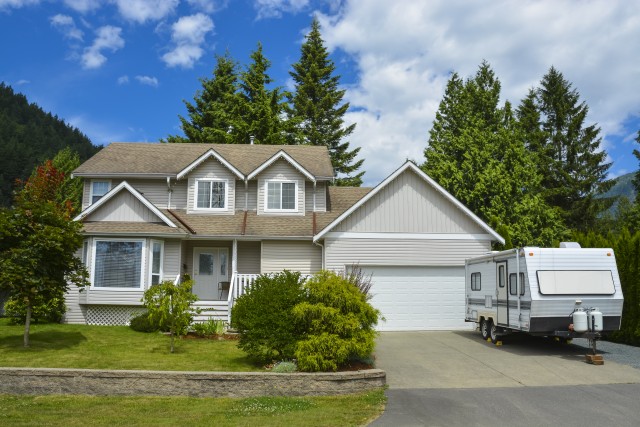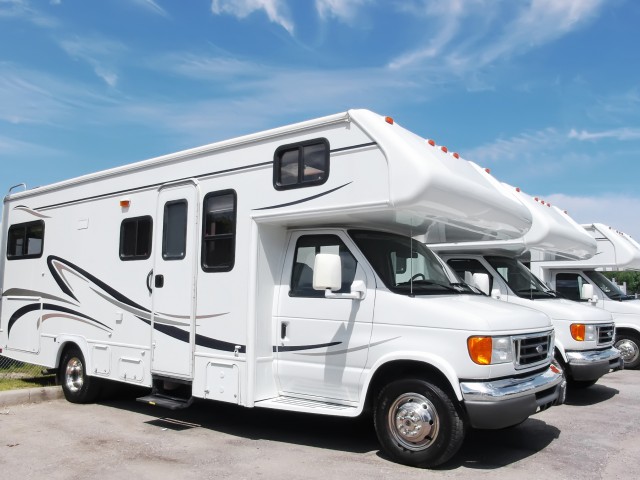Where to Store Your RV, Trailer or Camper
by Gretchen Pille | October 27th, 2015 This post was originally published on the SpareFoot Blog
This summer you made your home on the open road. The amount of memories created is rivaled only by the amount of miles you put on your RV. But soon that open road will be icing over and it will be time to put your RV away for a few months. Between your home and the variety of self storage opportunities, there are a lot of options for storing your RV. Each option has benefits and drawbacks.
To make the process stress-free, Storage.com has created a guide to help you weigh the pros and cons of each RV storage method. Read on to learn what self storage solution would best fit your needs.
STORING YOUR RV IN YOUR GARAGE
As far as recreational vehicles go, a standard garage will be able to fit campers and trailers that run on the small side, typically a class B (which run between 16-22 ft according to GoRVing.com) or smaller class C (21-35 ft). If the RV you need to store is larger than this, storing it at your home may be out of the question.
Pros:
- Overall Cost – Storing an RV at your own home doesn’t cost anything.
- Protection – Keeping your RV indoors protects it from damage the sun, hail, snow, rain, and other weather conditions can cause, saving you money on repairs later.
- Secure – Indoor RV storage of any type also protects your RV from theft and vandalism.
- Convenience – When your RV or camper is parked in your own garage, taking it for a spur of the moment spin is easy.
Cons:
- Conspicuous – The RV takes up space you could be using for things you use more often, such as a snow blower, shovels, lawn mower, bike, or another car.
- Uninvited Guests – Bugs and other unwanted pests can find their way into your garage, and you can bet those critters will want in your RV as well.
STORING YOUR RV IN YOUR DRIVEWAY OR BACKYARD

Keeping your RV, camper, or trailer outdoors on your own property is another free and easy option. However, it is still important to weigh the pros and cons. To combat the elements that can damage your RV, camper, or trailer, there are a few accessories that you may find beneficial, such as a carport or RV cover.
Pros:
- Overall Cost – Storing an RV on your own driveway or in your own yard doesn’t cost you anything.
- Convenience – Last minute road trips are much easier to pull off when your RV is on your property.
Cons:
- Neighborhood Covenants – If you’re storing in an area where homes are close together, your neighbors may consider your recreational vehicle to be an eyesore. What’s more, your neighborhood or HOA may have rules against parking your RV outside.
- Weather Conditions – Your RV will be exposed to harsh weather conditions like rain, snow, hail, and intense heat and cold. This type of weather can damage your RV, camper, or trailer and cost you money on repairs. RV covers provide an extra layer of protection. They can keep out water, precipitation, and UV rays, as well as bugs and other critters. RV covers typically start around $200 and increase in price based on the size of your vehicle. RV Share is a helpful resource for information on RV covers. RV Travel strongly encourages you buy an RV-specific cover, as using a standard tarp will cause more damage than protection.
- Security – Parking your RV outside leaves it vulnerable to theft and vandalism.
- More work for you – To ensure that your RV is secure and protected, you’ll want to consider installing a carport, which cost between $900 and $4,000, depending on the size.
NEED AN RV STORAGE RENTAL GUIDE?
STORING YOUR RV AT A SELF STORAGE FACILITY

Overall, the greatest benefit from any type of RV storage in a facility is going to be security. The three most common types of RV storage in a facility are outdoor, covered, and indoor.
OUTDOOR RV STORAGE
The most common type of storage for RVs is outdoor storage. Outdoor RV storage entails parking your RV, camper, or trailer in a designated spot on the storage facility’s property. Outdoor RV storage is typically the most affordable option at any storage facility, and is a great solution for short-term storage.
Pros:
- Overall Cost – Outdoor RV storage is a simple storage method and is often the least expensive option at a storage facility.
- Security – The storage parking lot that serves as outdoor storage for RVs is typically located behind a securely fenced area in order to prevent any theft and vandalism.
Cons:
- Weather Conditions – Since your RV will be outside, it is exposed to extreme weather conditions like rain, hail, and snow storms. Damage from these conditions can cost you more money on repairs than you saved in choosing less-expensive storage.
COVERED RV STORAGE
Covered RV storage is the most popular method among owners of medium and larger RVs. With covered RV storage, your RV is parked outside under a sheltered area, often a roof or awning. This offers some added protection from unfavorable weather conditions. Covered RV storage is a good idea if you plan on storing your RV long-term.
Pros:
- Compromise – As far as price and protection are concerned, covered RV storage is the best compromise between indoor and outdoor RV storage.
- Security – Keeping your RV, trailer, or camper in a fenced-in storage facility significantly decreases its chances of falling victim to theft or vandalism.
- Overall Cost – Covered storage costs less than indoor storage.
- Protection – Under a roof or awning, your RV, camper, or trailer is more protected than if it were simply placed in outdoor RV storage.
Cons:
- Exposed to Weather Conditions – While covered RV storage offers more protection than outdoor RV storage, an awning alone will not completely protect your RV from extreme weather conditions.
INDOOR RV STORAGE
For a camper, trailer, or very small RV (most likely only Class B), indoor storage can be a great option. Indoor RV storage at a facility is going to be the most expensive option, but also offers the most protection. However, because it is hard to come by, indoor RV storage not the most common RV storage method people choose.
Pros:
- Security – Four walls, a locked door, and a secure facility will protect your RV from theft and vandalism.
- Protected from Weather Conditions– Indoor storage keeps your RV safe from the damaging effects of the sun, cold, rain, and snow.
- Access – Some storage facilities offer 24-hour access using secure electronic gate access. So you get the same convenience of storing your RV at your home, with the security of a storage facility.
Cons:
- Overall Cost – Indoor RV storage is the most expensive storage option. However, paying more to store it well may save you money on repairs later.
- Overall Size – Class A and Class C RVs are not likely to fit in indoor storage. Be certain that the dimensions of your storage unit are large enough to house your RV before you reserve a storage unit.
- Hard to Find – Indoor RV storage is not very common, so finding it near you may be a challenge.
Most self storage facilities have security features that you simply can’t replicate at home such as electronic gate access, alarmed storage units, and video surveillance. Here are a few important questions to ask when making a reservation for your RV at a self storage facility:
- Insurance Options – It’s important know what kind of protection you have should something happen to your RV, camper, or trailer during its time at a storage facility.
- Security features – Storage facilities often have security features such as video surveillance, alarmed units, and electronic gate access. You’ll want to know exactly what measures are taken at the facility you choose.
- Access – Most storage facilities only allow access during specified gate hours. Make sure you are aware of what those hours are, as that may dictate when you can embark on your next RV adventure
All images have either been provided by a listed organization or are licensed under the Creative Commons.
Leave a Reply